 |
Organic Society
Vocations of the European Peoples
Plinio Corrêa de Oliveira
I was asked to define the different vocations of the European nations regarding their fidelity to grace and love of God.
The Spanish and the Portuguese
Every Catholic people has the obligation to be faithful to the principles of our Holy Faith, and to profess it without stain of error. This is basic. However, two peoples – the Spanish and the Portuguese – took this fidelity to its final consequences. There is a type of fidelity that is characterized by establishing the greatest possible separation between good and evil, so as to promote good and abhor evil.
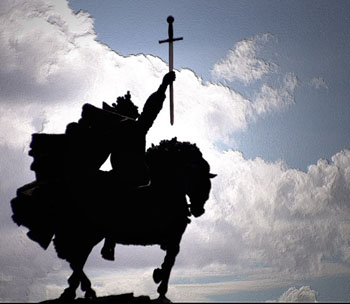
The Spanish and Portuguese were called to conquer for Christ.
Above, Alfonso El Conquistador |
This fidelity excels in seeking and affirming the keenest and more expressive characteristics of good. Only then does it rest, satisfied. It is a fidelity that is characterized also by an abnegation that goes so far as to offer one’s life. Our Lord affirmed that there can be no greater friend than one willing to give his life for Him. This is the gift of Portugal and Spain: to give their lives for Our Lord, for the Catholic Church.
Both nations carried out the Iberian Reconquest, which, along with the First Crusade, were the only victorious Crusades. In the others, things did not go so well. The ideal of Crusade reached its apex in the First Crusade and the Iberian Reconquista. Spain and Portugal developed that form of love of God which is to give their lives for Him. We can ask if there is anything more beautiful than this.
The Italian
God gave Italy a vocation to support the Catholic Church in a very intimate way. He placed the Vatican in Rome and surrounded the Church with Italians. He made Italy the ecclesiastic nation par excellence, in such way that it became customary for an Italian to govern the Church, to be a Cardinal of the Curia, and so on. Italy is the nation of the great theologians, the great rulers of the Church - the spiritual Caesars who govern the spiritual Empire of Jesus Christ.
Which is more beautiful, to die for the Church or to be her highest expression? It is a beautiful problem for which I do not have a solution.
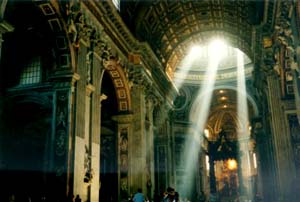
The center of the Church is Rome, which radiates the light of the Catholic religion throughout the world.
Below, Vatican square at night
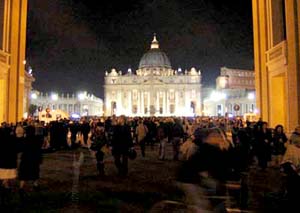
|
How wise Divine Providence was to have the Church be identified with Italy in so many ways. Even the weaknesses of the Italian people help other peoples to accept Italian leaders in the Church. It would be difficult for a French Pope to impose himself on the Spanish world, or for a German Pope to be obeyed by the Latin world. It would be almost inconceivable to have a Scandinavian Pope; many would have difficulties in accepting a Russian Pope, and so on. However, how easy and natural it is to accept an Italian Pope!
There is something in the chronic military failures of the Italians – even though they sing about and paint the military heroes magnificently – there is something in this lack of military success that sweetens its relationship with every other people. It was not made for great conquests on this earth, since God gave it the scepter over souls to conquer Heaven.
I realize there is no rule saying that the Pope has to be Italian, and actually there were a number of Popes who were not, but who cannot see that there is a special kind of intelligence and calm in the Italian spirit that understands all the other European peoples? On the contrary, most of the others do not understand one another: the Germans do not understand the French and vice-versa; the Spanish do not understand either the French or the Portuguese peoples… We could go on and on opening the accordion of this mutual lack of comprehension. However, the large, wet eye of the Italian intelligently and placidly discerns the psychologies of other peoples.
I mentioned that the Italian understands the mentalities of European peoples, but I could also have mentioned others peoples. A Vatican Monsignor would easily understand the psychological characteristics of any Armenian, Chinese or Indian when dealing with them. He would understand them without making fun of them, as would the French or the English. Then he utilizes this understanding to come to an agreement with them and reach his goals. In general he does not become irritated with anyone, is not influenced by the others, and pursues his own objectives until they are achieved.
Surely this is a people made for the Papacy, the government of the Church, and for dealing with all souls.
The German
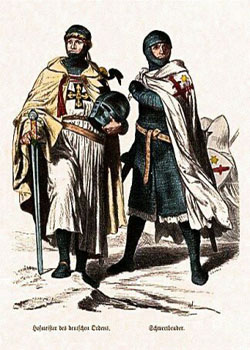
A master and a knight of the Teutonic Order |
The German is different from the Italian. To make a comparison, the German might be called the Spaniard of the East. If the German had corresponded well to his vocation, he would be for the Eastern peoples the untamed warrior and conqueror that the Spaniard was for the peoples of the West. He would hold this place not by means of an intuitive spirit, like the Spanish, but through the logical, organizing and straightforward spirit of the German people.
If the Germans had been faithful, they would have achieved the conversion of the East that they started to make, but stopped because of Protestantism. They would have tamed Russia, not to exploit it, but to implant the Kingdom of Our Lord in it. Then, after Russia and by means of it, they would have gone on to India and China.
It is true that Spain and Portugal brought many countries to the Catholic Faith. But it is also true that in great part it was due to the German Knights of the Teutonic Order or other German knights that Sweden, Denmark, Norway, Austria, Hungary, Slovakia, the Czech Republic, and parts of Poland, Switzerland, and the Balkans were brought to the Catholic Faith. In large measure these nations converted thanks to successful crusades – not often spoken of – carried out overall by German knights.
The Austrian
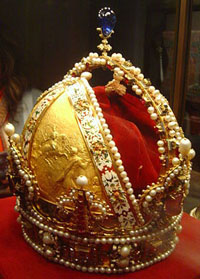
The Austrian Imperial Crown |
Close to the German people, but distinct from it, is the Austrian people. It is unique. It is a people similar in some ways to the German and in others to the Italian. It also has affinities with the French. The Austrians are called to govern Europe in the temporal sphere. They have a talent analogous to that of Italians in the religious sphere.
The Austrian is amiable, charming, smiling, entertaining and understanding everyone as they interact and engage in politics with them. The Austrian has the most singular ability to conquer without conquering, to allow other peoples to follow their own ways, maintain their own characteristics, and retain their own forms of government, while being under the Austrian hegemony. The Austrian instinctively knows how to irradiate culture and conquer spiritually without having to stamp on a people with an iron boot as the Protestant Prussian does. Before Protestant Prussia was born, the German way of conquest was much different.
The Austrian and the Italian, then, are similar peoples with universal missions.
The French
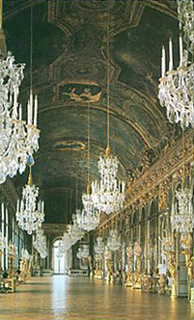
Versailles, admired and copied everywhere |
A different type of universality is found in the French. The French are called to synthesize all the other European peoples. They assimilate ways of living and being from neighbor peoples, adding a personal touch that makes them more perfect.
Chivalry was a general phenomenon in Europe, but the model of Chivalry was on the whole found in France. Feudalism was also a medieval way of governing common to most of Europe, but French feudalism and its correspondent divisions of nobility were the models and patterns for the others. Every people has its own food, wine, dress, perfumes, etc. but when the French touch them, they take on a higher form and become a model for others. This is a consequence of France being the first-born nation of the Church. The others naturally tend to follow its example.
The Frenchman is the natural leader of the European peoples, as long as he does not become too full of himself. When the Frenchman loses his love for the Church, he also loses his leadership and enters into competition with those who should be inspired by him. Taking this wrong path, the French alienate other peoples, instead of leading them to be faithful to the Church.
The English
With the English, we find something similar to what happened with the Prussian people. Both peoples were so deeply changed by heresy that it becomes difficult to reconstitute what they would have been had they been faithful.
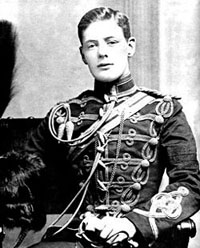 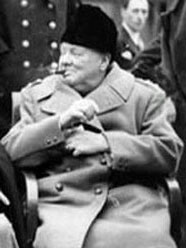
The promise and freshness of spirit still present in the young Churchill, left, were crushed in the skeptical old Churchill, right. |
What is the bad side of England? England has a commercial, Masonic, cold and frustrated spirit. There is much emptiness and frustration in the English spirit. With Anglicanism, the magnificent cathedrals of old became emptied of life and grace. They are doubtless still very distinguished, but they lack life. They are elevated, but they are dry as an umbrella stick. Most of the simple churches in Rome have more life than the magnificent Westminster Abbey.
If you look at a picture of Churchill or Edward VIII when they were young, you still see in them a springtime spirit. But when you compare these pictures with the old Churchill or the Edward VIII married with Wallis Simpson, there is an immense change. Both men are so saturated with the Masonic spirit that all the promises of youth were razed to the ground.
What is the English vocation? I would say that England was called to realize something of an angelic innocence. In the English soul, there is something so honest and serene that it obliged Protestantism to assume a Catholic over-garment – Anglicanism – otherwise it would not have been swallowed by the people.
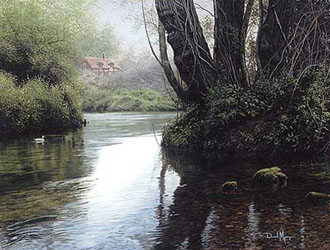
The landscapes are reminders of the Catholic English vocation.
An English landscape by David Morgan |
Something that still reflects the good side of the English soul is the English landscapes. In them, it is rare to find an astonishingly beautiful panorama, but all of the English landscapes are filled with charming little gardens and corner spots that are called to be appreciated separately. In those ambiences, there is such freshness and such richness that only very innocent souls, almost angelic souls, know how to admire them properly.
Here is a bridge with a cluster of ducks swimming under it; over there is a mossy stone in the water with small blue flowers; further down the way an ivy climbing a wall is worthy of a painting. Or perhaps a tragic wind blows away the fog to reveal the tower of a castle. It is through flashes like these that we can reconstitute the innocence and purity that the English are called to have when they are faithful. This angelic innocence certainly was the substance of the early medieval English spirit which gave many saints to the Church.
So, we have the Italians who identify themselves with the Church, the Austrians who govern the others through the Holy Roman Empire, the French, the first born and most esteemed nation of the Church, and others who are either the heroic warriors or angelic contemplative spirits. All the beauties of these different vocations correspond to the kind of love for God that they were called to have.
Which one would be the first if all would correspond fully to their vocations?
While we could raise hypotheses, it is very difficult to choose a first from among such high vocations. This is a secret of God that we will understand at the Last Judgment.

Posted May 15, 2007

  | | Prof. Plinio |
Organic Society was a theme dear to the late Prof. Plinio Corrêa de Oliveira. He addressed this topic on countless occasions during his life - at times in lectures for the formation of his disciples, at times in meetings with friends who gathered to study the social aspects and history of Christendom, at times just in passing.
Atila S. Guimarães selected excerpts of these lectures and conversations from the trancripts of tapes and his own personal notes. He translated and adapted them into articles for the TIA website. In these texts fidelity to the original ideas and words is kept as much as possible.

Related Topics of Interest
 The Calvinist and Lutheran Mentalities The Calvinist and Lutheran Mentalities
 What is Organic Society? What is Organic Society?
 Organic Society and Desire of Heaven Organic Society and Desire of Heaven
 The Moon and its Halo The Moon and its Halo
 Paradise: A heavenly Court Paradise: A heavenly Court
 Departure for the Crusade: A Desire for Sublimity Departure for the Crusade: A Desire for Sublimity
 The Role of Admiration The Role of Admiration

|
Organic Society | Social-Political | Home | Books | CDs | Search | Contact Us

© 2002- Tradition in Action, Inc. All Rights Reserved
|
 |
|